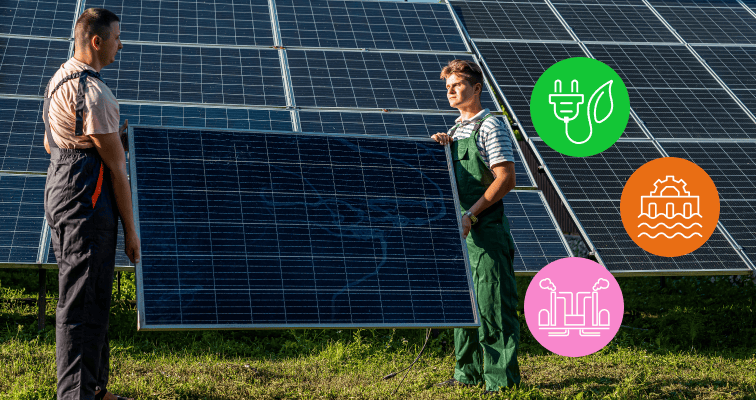If you are looking to invest in renewable energy, you are in the right place. Find out what drives the industry, the benefits and risks, and what you need to know when investing in renewable energy.
Whether you are just starting out in the world of stocks or are an experienced investor, chances are you have come across the energy sector. It includes everything from traditional gas and oil giants to miners and everything in between. But there is a relatively new player in town — renewable energy companies — and they could be a potential addition as you diversify your portfolio.
What is the renewable energy industry?
The renewable energy industry is a part of the energy market — focused on harnessing natural resources that are constantly replenished, such as the sun and wind, and will, therefore, never run out, unlike other types of energy, including coal and crude oil.
According to the International Energy Agency, 35% of the world’s total power generation will be from renewable sources by 2025, with both production and demand for renewable energy set to see continued growth into the future. In recent years, wider investment in renewable energy has grown alongside an awareness of climate change and efforts to be more environmentally conscious.
While the world’s appetite for electricity continues to grow, projected to triple by 2050, renewable energy continues to make up just a portion of this total.

Why is green energy investment increasing?
When you think about renewable energy in modern society, one major reason for its surge over the past decade has been society’s acceptance of climate change. As a result, there has been a subsequent push to be more environmentally friendly in how we generate and use energy.
More recently, consumers have driven the renewable energy industry further by becoming more conscious of how they use energy.
However, energy developers have long seen the value in harnessing the power of renewables, even before the concept of climate change became widely accepted, and they have been building renewable capacity with the support of government incentives such as tariffs and subsidies.
Some are now looking for ways to exploit alternative technologies rather than continue to use carbon-heavy energy sources. This trend is reshaping the energy market, and it looks like it will continue to transform the sector for years to come.
Types of renewable energy for investment
There are many different types of renewable energy. Arguably the best-known renewable energy is solar power, but there has also been significant research on, and investment in, wind power, hydropower and other forms of renewable energy.
Some of the most common types of renewable energy include:
- Solar energy — using the sun to generate power
- Wind energy — using the wind to generate power
- Hydropower — using moving water to generate power
- Ocean energy — using waves and currents to generate power
- Bioenergy — using organic materials to generate power
- Geothermal energy — using thermal energy to generate power
Some companies are also interested in technologies adjacent to renewable energy that strengthen our power grids, such as battery storage and smart technology that predicts usage levels.

How to invest in renewable energy
There are several different ways to invest in renewable energy. Some of the most popular include:
Renewable energy stocks
Across the world’s stock markets, you will find various companies operating in the renewable energy space. Buying shares in renewable energy stocks offers you a stake of ownership in these companies and allows you to invest in clean energy projects in which you believe. Some companies may also pay dividends to shareholders.
You might choose to invest in companies producing renewable energy directly, or you may decide to invest in those manufacturing the equipment needed to generate, capture or store energy. There are also a variety of companies working in adjacent industries, creating batteries to store electricity and more.
Tip: Research a company’s historical performance, review its recent earnings reports and choose assets to build a diversified portfolio.
Renewable energy ETFs
Functioning in much the same way as stocks, renewable energy ETFs provide exposure to dozens of different stocks belonging to companies producing or supporting the production of green energy. You may opt to invest in an ETF that tracks an assortment of green energy companies. Alternatively, you could invest in a more specific area of the renewable energy sector, such as solar energy or companies producing raw materials used within the industry.
Renewable energy futures and CFDs
If you are thinking of getting involved in renewable energy trading or investing, futures and CFDs are other options to consider. Both CFDs and futures allow you to speculate on the price movements of renewable energy assets, whether you believe they will rise or fall.
Is renewable energy a good investment?
Some argue that investing in renewables is also an investment in the future, but, just like any other investment, there are some potential benefits and risks associated with renewable energy.
Benefits of investing in renewable energy stocks
Green equals growth
The green revolution is not a fad, and the adoption of renewable energy continues to grow. We are likely to see more companies entering the renewables market and the potential for growth by existing companies.
Attractive returns may be achievable over the long term
With consumer enthusiasm on the rise, energy companies are now seeing their initial investment in renewables justified, allowing them to spend more on larger projects for potentially greater profits in the coming years.
A passive income stream with an impact
When investigating listed companies that focus on renewable energy, you may find some that pay dividends to their shareholders. This can create a passive income stream that supports your investment strategy.

Risks of investing in renewable energy
Interruptions
Some days, the sun does not shine as brightly as on other days. Sometimes the wind does not blow hard enough. In contrast to fossil fuels, these uncontrollable factors mean that we cannot rely completely on renewables — at least right now — to produce constant power.
This concern can dent belief in renewable energy production and limit adoption, which, in turn, can hurt renewable energy stocks.
Other factors affecting the renewable energy industry — ranging from the environmental impact of the equipment used and the resources needed to produce the infrastructure required — to the strain placed on power grids as temperatures continue to rise around the globe — also need to be considered before deciding to invest in the sector.
Cost
While the cost of equipment, such as solar panels, continues to go down, the cost of harnessing renewable energy is still very expensive.
Government uncertainties
You never know when governments may retract certain incentives around renewable energy, change regulations or introduce taxes. While renewable energy has tended to offer promising returns in recent years when compared to fossil fuels, it is difficult to ascertain how changes to government regulations may affect the future viability of companies operating in the sector.
The final word
Renewable energy is well and truly here to stay and may be the future of energy production globally. Green energy investments could be a welcome addition to your strategy, but, as always, it is important to do your research and weigh up whether the sector is right for your personal investment goals.
Learn more about building your portfolio with the eToro Academy.
Quiz
FAQs
- Should I invest in renewable energy?
-
Determining which assets to invest in is a personal choice. Before investing in renewable energy or any other industry, consider your overall investment strategy, risk tolerance, and future investment goals. It is important to do your own research, evaluating how stocks have performed historically and identifying the factors that may impact their future performance.
- When will we run out of fossil fuels?
-
Although estimates do vary, it is predicted that the earth’s supply of fossil fuels will be depleted in just over a century.
- What is clean energy?
-
“Clean energy” is a broad umbrella term that can include anything from renewables to alternative transportation technologies.
This information is for educational purposes only and should not be taken as investment advice, personal recommendation, or an offer of, or solicitation to, buy or sell any financial instruments.
This material has been prepared without regard to any particular investment objectives or financial situation and has not been prepared in accordance with the legal and regulatory requirements to promote independent research. Not all of the financial instruments and services referred to are offered by eToro and any references to past performance of a financial instrument, index, or a packaged investment product are not, and should not be taken as, a reliable indicator of future results.
eToro makes no representation and assumes no liability as to the accuracy or completeness of the content of this guide. Make sure you understand the risks involved in trading before committing any capital. Never risk more than you are prepared to lose.


